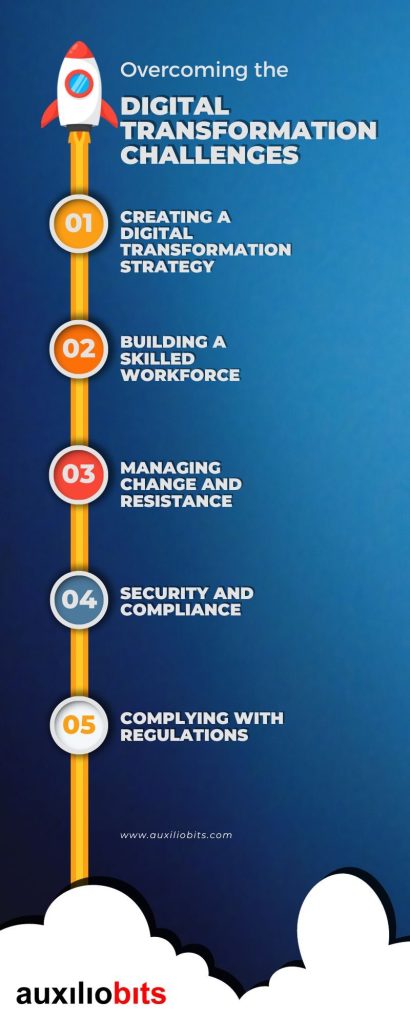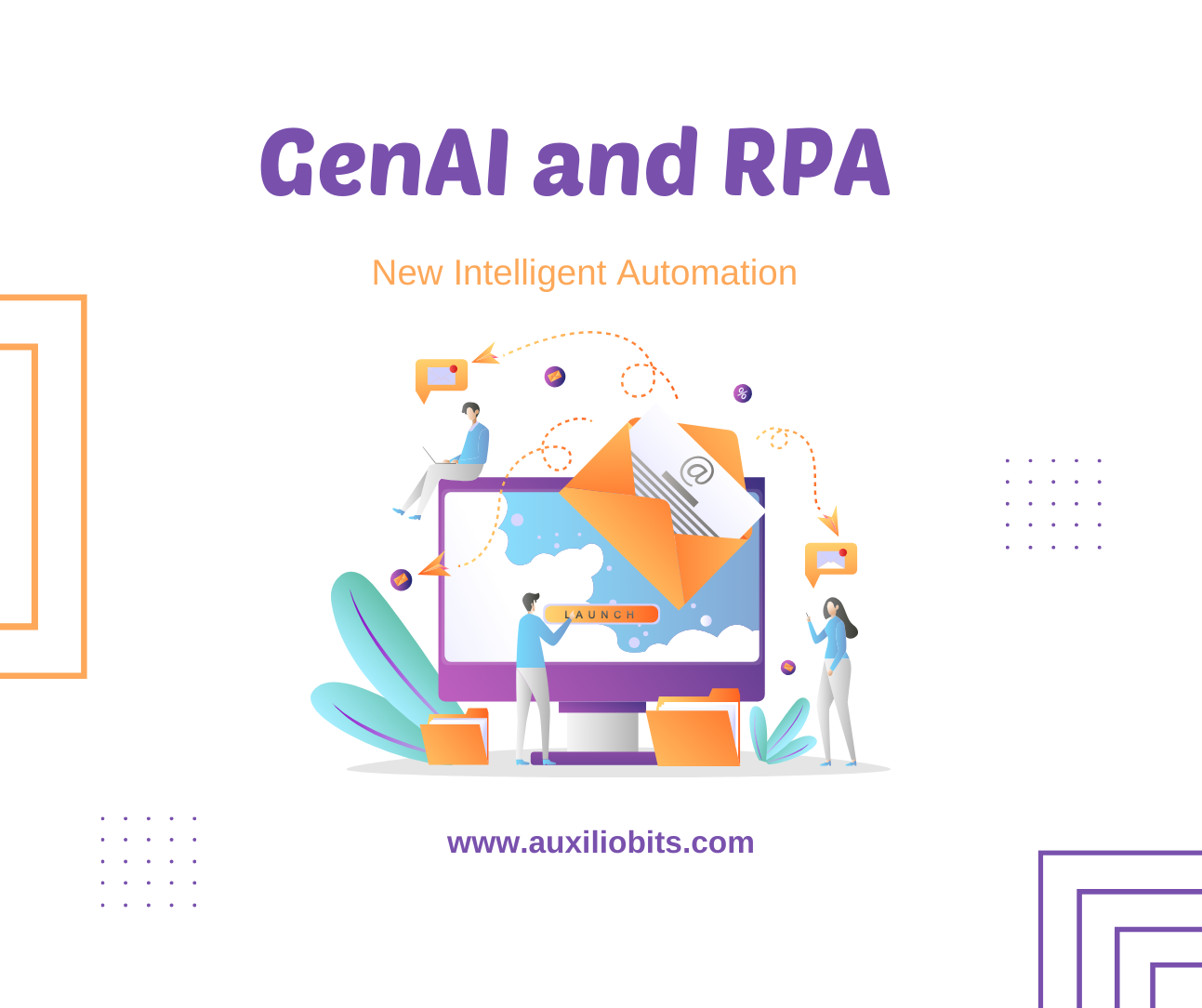Key takeways
- It involves integrating digital technologies into all aspects of an organization, fundamentally altering how it operates & delivers value to customers. Digital transformation ensures businesses remain relevant in the eyes of their customers.
- Digital transformation is an ongoing process and comes with its set of challenges. Some of the challenges include budget constraints, resistance to change, etc.
- Digital transformation is imperative to stay competitive in today’s dynamic market. Hence, businesses must overcome the challenges and adopt a digital first approach.
- A well planned digital transformation strategy can help overcome the challenges and make the deployment seamless.
- Businesses must keep abreast with the latest trends and technologies and integrate them into their digital transformation journey to remain agile.
In a world where bytes have become the new currency, businesses are engaged in a relentless race – the race to embrace digital transformation. It’s a race where the stakes are high, the competition intense & the rewards immense. As the digital era unfolds, the question isn’t whether to participate, but rather ‘how to seize the lead & maintain it?’. Imagine your business as a digital chameleon, adapting seamlessly to the ever-shifting landscape & thriving in the face of challenges that would leave others struggling.
Here, we will discuss the strategies & tactics that define the path to success in this electrifying domain.
So, let’s deep dive into common challenges in implementing digital transformation and how to overcome them!
What Is Digital Transformation?
Digital transformation is not merely a buzzword but a fundamental shift that has reshaped the business landscape. It involves integrating digital technologies into all aspects of an organization, fundamentally altering how it operates & delivers value to customers. This encompasses adopting cloud computing, embracing artificial intelligence (AI) & leveraging data analytics to streamline processes & enhance decision-making.
Importance Of Digital Transformation
The importance of digital transformation cannot be overstated, & the numbers bear witness to its significance. According to Gartner, 91% of businesses are engaged in some form of digital initiative & 87% of senior business leaders say digitalization is a priority. (Source : Quixy)
What’s more, businesses that have successfully embraced digital transformation witnessed a staggering 23% increase in profitability compared to their less digitally-focused peers. (Source : Forbes)
But it’s not just about profits, it is actually about relevance. In an era where consumers wield the power of choice at their fingertips, digital transformation ensures businesses remain relevant in the eyes of their customers.
Understanding Digital Transformation Challenges
Common Challenges Faced By Businesses
- Budget Constraints: A survey from PwC shows that 45% of executives think their company does not have the right technology & budget to implement digital transformation. (Source : Templeton). Allocating resources optimally becomes a Herculean task as organizations seek to embrace innovation while managing costs effectively.
- Resistance to Change: Digital transformation often encounters resistance from within. A survey identified employee reluctance as the most significant barrier to the success of digital transformations. It’s crucial to address this challenge by fostering a culture of adaptability and continuous learning.
Impact Of Technological Disruption
- Opportunities for Innovation: Technological disruption isn’t merely a challenge, it is a gateway to innovation. Emerging technologies like blockchain, the Internet of Things (IoT) & artificial intelligence (AI) offer exciting avenues for businesses to reimagine their processes & deliver greater value to customers.
- Market Disruption Risk: While disruptive technologies present opportunities, they also pose a risk of market disruption. Companies that fail to adapt may find themselves sidelined by more agile and digitally savvy competitors. Staying ahead of these trends is not just an option but a necessity.
Key Benefits Of Successful Digital Transformation
Improved Customer Experience
In the digital domain, customer experience reigns supreme. Providing exceptional experiences can lead to significant rewards. As per the survey, 86% of buyers are willing to pay more for a great customer experience. (Source : Forbes). Successful digital transformation allows you to personalize interactions, anticipate customer needs, and offer seamless omnichannel experiences.
- Personalization: Leveraging data analytics and AI, you can tailor products and services to individual preferences, enhancing customer satisfaction and loyalty.
- Real-Time Engagement: Digital transformation enables real-time engagement with customers through chatbots, personalized emails, and interactive websites, creating meaningful connections.
Increased Operational Efficiency
Digital transformation is not just about enhancing customer-facing aspects; it’s also a powerful tool for streamlining operations. According to a survey by Gartner, 80% of CEOs are increasing investment in digital technologies in 2023 to achieve greater efficiency and productivity. (Source : MIT).
- Process Automation: Automation of routine tasks reduces manual errors and accelerates processes, leading to cost savings and increased productivity.
- Data Insights: Advanced analytics provide deep insights into operations, enabling data-driven decisions that optimize resources and performance.
Enhanced Data-Driven Decision-Making
We are all aware that data is worth its weight in gold in the digital era. Successful digital transformation equips businesses with a treasure trove of data, which, when analyzed effectively, can drive informed decision-making.
- KPI Monitoring: Key Performance Indicators (KPIs) become more accessible, allowing businesses to track progress and adapt strategies in real time. Companies that leverage KPIs effectively achieve more in revenue and savings.
- Predictive Analytics: Advanced analytics models can forecast market trends, customer behavior & operational needs, giving businesses a competitive advantage. The predictive analytics market in business intelligence is expected to reach $29.8 billion by 2026, growing at a CAGR of 21.3% from 2021 to 2026.(Source : Market Splash).
Competing In The Digital Age
In a world where technology evolves rapidly, businesses that fail to adapt risk falling behind. Successful digital transformation positions your business as a frontrunner in the digital race.
- Agility: Digital transformation enhances organizational agility, allowing businesses to pivot quickly in response to market changes or emerging technologies. Businesses that prioritize agility are 2.5 times more likely to be top performers. (Source : Culture Monkey).
- Innovation: Embracing digital transformation fosters a culture of innovation, enabling businesses to develop new products, services, and business models. Innovative companies achieve higher profit margins compared to their peers.
Overcoming Digital Transformation Challenges
Creating A Digital Transformation Strategy
Success in digital transformation begins with a well-crafted strategy. According to a survey, 89% of all companies have already adopted a digital-first business strategy or plan to do so and expect a positive impact. (Source : Forbes).
Here’s how to craft an effective strategy:
- Clear Objectives: Define specific goals and outcomes you want to achieve through digital transformation. Setting clear objectives provides a direction to formulating the strategy for success.
- Technology Roadmap: Create a technology roadmap that outlines the tools, platforms, and solutions needed to achieve your objectives.
Building A Skilled Workforce
Your workforce is the driving force behind digital transformation. Investing in their skills is crucial. A recent study by PWC found that 79% of CEOs believe that a lack of digital skills is a significant concern. Here’s how to build a skilled workforce: (Source : Fair360).
- Training and Development: Offer continuous training and development programs to keep your employees updated with the latest digital skills.
- Hiring Digital Talent: Recruit individuals with digital expertise to complement existing skills within your organization.

Managing Change And Resistance
Change is often met with resistance, but effective change management can overcome it. According to research from Towers Watson, organizations that manage change effectively are 3.5 times more likely to outperform their peers. (Source : LinkedIn).
Here’s how to manage change and resistance:
- Communication: Communicate the reasons for change clearly and transparently, addressing concerns and highlighting the benefits.
- Employee Involvement: Involve employees in the change process, seeking their input and feedback to make them active participants.
Security And Compliance
Ensuring Data Security In The Digital Age
Digital transformation often involves the collection and storage of vast amounts of sensitive data. Protecting this data from cyber threats and breaches is non-negotiable. Consider these sobering statistics:
- Cybersecurity Costs: Cybersecurity incidents cost U.S. companies an average of 9.48 million U.S. dollars, up from 9.44 million U.S. dollars in the previous year. (Source : Statista).
- Data Breach Impact: The global average cost of a data breach in 2023 was USD 4.45 million, a 15% increase over 3 years. (Source : IBM).
Complying With Regulations
Digital transformation often extends your reach beyond national borders. This necessitates compliance with various data protection regulations, such as the General Data Protection Regulation (GDPR) and the California Consumer Privacy Act (CCPA). Non-compliance can result in substantial penalties.
- GDPR Fines: GDPR violations can lead to fines of up to €20 million or 4% of global annual revenue, whichever is higher. (Source : EQS).
- CCPA Penalties: CCPA violations can incur fines of up to $7,500 per intentional violation. (Source : Clarip).
Cybersecurity Best Practices
Preventing cyber threats requires a proactive approach:
- Employee Training: Train your employees to recognize and respond to potential threats like phishing attacks. Research indicates that 94% of malware is delivered via email. (Source : Egress).
- Multi-Factor Authentication (MFA): Implement MFA to add an extra layer of security to your systems. MFA can prevent 99.9% of automated attacks. (Source : Zippia).
Future Trends In Digital Transformation
Anticipating Technological Advances
The pace of technological innovation is relentless. To remain competitive, organizations must keep an eye on emerging technologies:
- 5G Connectivity: With the rollout of 5G, data transfer speeds are expected to be up to 100 times faster than 4G. (Source : Qualcomm).
- Quantum Computing: Quantum computers have the potential to provide solutions to complex problems that are currently beyond the scope of classical computers.
The Evolution Of Industry 4.0
Industry 4.0 ushers in an era of integration of digital technologies and manufacturing.
Here’s what’s in store:
- IoT Expansion: IoT adoption is set to grow, connecting even more devices and systems in manufacturing and logistics. According to the report, the number of IoT-connected devices is projected to reach 75.44 billion by 2025. (Source : FindStack).
- AI in Manufacturing: AI and machine learning will play an increasingly significant role in optimizing manufacturing processes.
Conclusion
In the digital era, where the only constant is change, how will you steer your ship toward success? Are you ready to embrace the limitless possibilities of digital transformation? Digital transformation isn’t just a destination, it’s a continuous evolution. It’s a commitment to innovation, a dedication to agility & a steady belief in the power of technology to shape the future. In a world where standing still means falling behind, your willingness to adapt, learn & grow will determine your destiny. The digital frontier awaits & it’s yours to conquer.
For a hassle-free digital transformation, connect with the professional team at Auxiliobits! We have experts who will provide customized solutions to meet your digitalization goals.
Stay Tuned for upcoming blogs on latest technologies!




 July 19, 2024
July 19, 2024
